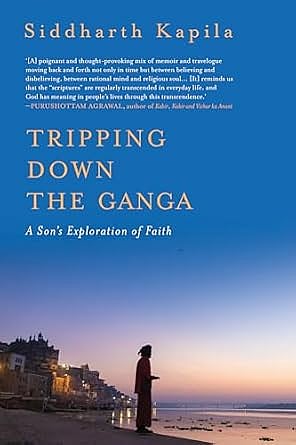Pilgrim’s Puzzle

“If Rio had its Carnival, then Varanasi had Shivaratri,” writes lawyer-turned-author Siddharth Kapila in his book Tripping Down the Ganga, an intimate account of pilgrimages undertaken over four decades of his life beginning with the 1990s when he was a child. The book abounds in this kind of light-hearted cultural critique that does not claim the mantle of an expert voice but sounds more like friendly banter in a hostel with fellow backpackers.
It reminds one of Ilija Trojanow’s travelogue Along the Ganga (2005), translated from German into English by Ranjit Hoskote because it traverses landscapes that lie between the Gaumukh glacier in Uttarakhand and the Ganga Sagar in West Bengal. Kapila, however, went to most of these pilgrimage centres with his mother Shashi—a devout Hindu who takes pride in her knowledge of rituals, her ability to offer spiritual counsel to relatives, and her good fortune in being able to support temples and ashrams.
Kapila’s book is likely to strike a chord with contemporary Hindu readers who find themselves both uplifted and embarrassed by the traditions that they have inherited. These are people who enjoy aspects like mythology, sacred geography, feasting, and the solace found in worship but want to dissociate themselves from religious bigotry and caste discrimination.
The author’s love-hate relationship with faith forms the nucleus of this book. He alternates between scoffing at his mother’s beliefs when they strike him as unscientific, and feeling jealous when he is unable to partake of both the ecstasy and stillness that faith provides. This book skilfully exposes the biases carried by people who put themselves on a pedestal for being rational and secular but struggle to accommodate diverse ways of thinking and being.
Imran Khan: Pakistan’s Prisoner
27 Feb 2026 - Vol 04 | Issue 60
The descent and despair of Imran Khan
Kapila starts off by describing himself as “an English-speaking, upper caste Hindu man” to clarify his position in the social hierarchy. This information is useful but only to a certain extent because this category can hold individuals who differ from each other on many counts. A clear acknowledgement of privilege is now expected in neo-liberal circles, and the author participates readily in this discourse. What strikes one as refreshing, however, is his capacity for reflection, and a willingness to admit that much progressive posturing is superficial.
He writes, “While my parents were routinely sympathetic to Hindutva, my sister and I bemoaned its rise. Despite our upbringing, my sister and I had transgressed in our romantic choices.” The author’s partner is a man curiously labelled as “a Muslim-born atheist now flirting with Buddhism”, and the author’s sister is married to a Sikh man. Despite these outward expressions of open-mindedness, he still regards Hinduism as the most inclusive of all religions. This is a classic instance of confirmation bias, and the author pits Hinduism against Buddhism, Christianity and Islam by presenting them in a reductive way.
Kapila’s sexuality occupies a marginal role in the book. In a poignant moment, he admits, “I’d had enough of poojas and yagnyas and yaatras ordering me to conform. I had to come clean.” When he came out, his mother said, “You mean to say you don’t like girls? But you look normal.” He replied, “I just feel a connection with people like myself.” Such exchanges happen in many Indian families but not everyone is brave enough to be vulnerable in print.
After stating that there is no central authority in Hinduism “passing decrees to execute gays” and celebrating the “long history of literature and imagery rich with representations of gender fluidity”, he notes, “We Hindus are a prudish bunch…What exists in our minds in bucketfuls, however, are notions of dharma and karma and the attendant ideals of manhood and family”.
Kapila’s book may not be the most definitive guide for pilgrims looking to wash away their sins in the waters of the Ganga, but it will certainly spark much-needed conversations.

